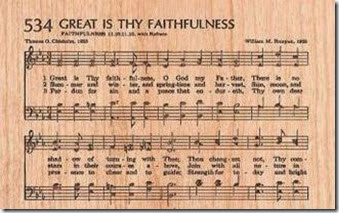
Lamentations is said to have been written by Jeremiah, the weeping prophet, even though the Bible does not specify the author. The timing is widely believed to have followed the fall of Jerusalem, though one Jewish site states:
In actuality, the widely accepted Jewish view is that Lamentations (or at least the bulk of it) was penned years before the actual calamitous events it depicts.This site states that Jeremiah chapter 36 describes the destruction of the first writing of Lamentations, and Baruch’s rewriting the dictation by Jeremiah. Their explanation ends with:
And indeed, seventeen years later, on the ninth of Av in the year 3338 from creation, the Temple was destroyed and the Jews led into captivity—precisely as Jeremiah had prophesied.
Ever since, the book of Lamentations is read every year on the eve of the ninth of Av.So, with such sadness, such mourning, do we find some of our most loved verses set right in the middle chapter:
It is of the LORD'S mercies that we are not consumed, because his compassions fail not. They are new every morning: great is thy faithfulness. (Lamentations 3:22-23 KJV)
Now, if you are a hymn-singing Christian, those four words should bring a tune to mind: Great Is Thy Faithfulness!
Morning by morning new mercies I see
In the midst of storms in our lives, we do sing out that our Lord is merciful to us, every day.
The LORD is my portion, saith my soul; therefore will I hope in him. The LORD is good unto them that wait for him, to the soul that seeketh him. It is good that a man should both hope and quietly wait for the salvation of the LORD. (Lamentations 3:24-26 KJV)
That hope we have in our faith:
Now faith is the substance of things hoped for, the evidence of things not seen. (Hebrews 11:1 KJV)
This entire chapter in Hebrews lists people who changed their lives and the lives of others through their faith in God. Some mock that faith – others would hear more. Luke describes this duality in his chapter on Paul’s sermon in Athens:
And when they heard of the resurrection of the dead, some mocked: and others said, We will hear thee again of this matter. (Acts 17:32 KJV)
The difference in Jeremiah and Lamentations seems to be that only Jeremiah and Baruch are shown to have that same faith in adversity. Each of these who demonstrated their faith in God’s faithfulness are remembered today. They are seen as examples who worked through adversity without deleting God from from their lives as abandoning them.
I have met people who did not make it through their adversity with their faith intact. And, others who appeared to have picked up faith in the midst of great pain – both physical and spiritual. I believe they learned to lean on the strength God has to offer. I would love to have that faith, reading and studying to help it grow:
So then faith cometh by hearing, and hearing by the word of God. (Romans 10:17 KJV)
Keep these middle verses in our heart, for adversity never is a stranger, even to children of our God.
No comments:
Post a Comment
Thank you for taking time to read and comment on the blog. Comments should take into consideration this verse: Finally, brethren, whatsoever things are true, whatsoever things are honest, whatsoever things are just, whatsoever things are pure, whatsoever things are lovely, whatsoever things are of good report; if there be any virtue, and if there be any praise, think on these things. (Philippians 4:8 KJV)